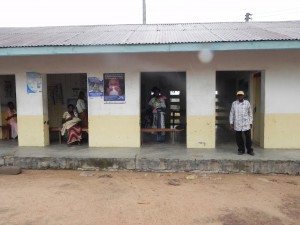In Tanzania, the National health indicators still reflect the poor social economic situation. Maternal and Infant mortality still very high (ministry of Health 2010). The most common health problems is communicable disease and obstetric complications which together accounts over 71% of all hospital visit (Ministry of Health 2009).
Although healthcare in Tanzania has eveolved since the country got independence 1961 where only 12 doctors were Tanzanian, still health care sysytem is facing a lot of challenges especially in villages where health centers are very poor with the most crudes operating room tools.
In order to address the problem of health professionals shortage, the country looked on clinical workers, some with education equivalent to tenth garde in the United states, send them to school. A system has been designed to train people who are less than doctors, less than pharmacist. These clinical officers are taught the top ten infectious diseases like malaria, they become pretty proficient.
When I was in a pharmacy school in University of Dar Es Salaam, there two clinical officers in my class who decided to become pharmacists. They used to tell us the challenges they faced when they were working as clinical officers. They informed us that they used to perform duties and procidures which where supposed to be done with specialists.
Despite their proficiencies, Assistant medical officers (Tanzanian version of physician assistant in the US), faced a daunting odds. By the time patients will little money and no transportation finally makes to the hospital are quite ill, having delayed care, many of whom are pregnant with complications end up dyingin their hands.
In my village Naymuswa health center, there is only one trained medical officer who work mainly as adminstrator. There are too few nurses and too little medical equipments. There is no X-ray machine, no ultrasound machine and a laboratory with only one old microscope! The are just now buliding one operating room. This health center serves tens of patients from Nyamuswa and surrounding village being the only health center in the area.
In the US if you fell ill and you are taken to the hosoital, you are going to meet a doctor. in my village and many villages in my country that is a luxury. A lot of people have gone to their graves without meeting a doctor. For instance in Nyamuswa health center, there are 2 Assistant medical officers who work there on a daily basis, few medical officers are based in Bunda which is 23 km away.
Nyamuswa health center like many health centers in th country needs good diagnostic equipment to make sure those Assistant medical officers diagnose patients very fast and give them right treatment. But, the country is poor and salaries are very low. Many doctors who are posted to work in rural areas close to peolpe quits to work on HIV prevention NGOs and other NGOs where they get paid more. My friend who is a doctor now is working in Mwanza with Malaria NGO which pay him more, he also sighted lack of support staff as a factor of leaving patient care
For all the success Tanzania has with AMOs, their experince can’t always match the knowledge of a medical doctor. Their training is limited, they think of first thing first. Their training is good for what they do, taking care of a patient day to day level, they don’t have time to learn the path of physiology, biochemistry, pathology to really understand the disease as medical student do, they don’t have much time in their training.
With all these challenges rural health centers face, Project Umoja is encouraging people to help improve provision of health care in villages starting with one health center at a time. If we manage to provide medical equipments, diagnostic tools, doctors and AMOs will be better equiped to provide services to patient fast and efficient. If we increase access to cl;ean drinking water in villages, the rate of transmission of wterborne diseases like cholera, dysentry, typhoid and diarrhea which kill a lot of children will be eliminated. If we help in the effort of training nurses, midwives and other health care support staffs, life of people in villages will be improved. Please give us a hand in anyway you can, together we can succeed.
